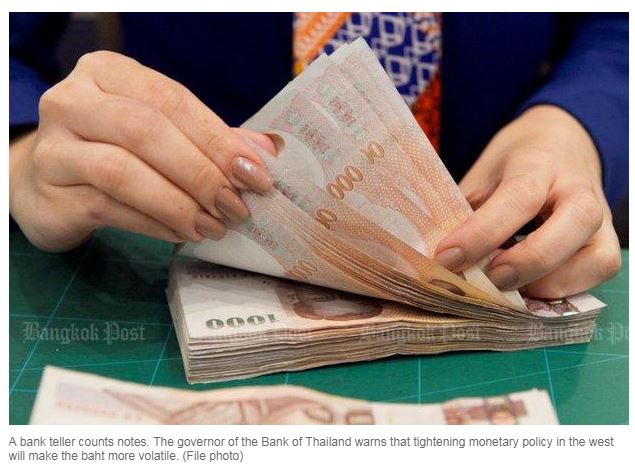Thailand: BoT warns of high volatility for baht
Bank of Thailand governor Veerathai Santiprabhob has warned that the baht’s volatility will remain high in the foreseeable future, prompted by tightened monetary policy in advanced economies and tit-for-tat trade tariffs among economic behemoths.
Foreign exchange volatility should persist, affecting both money and capital markets across the globe, but the situation is not worrisome as Thailand has buffers, including high foreign reserves, a current account surplus and low foreign-denominated debt, he said.
“The baht has retreated less rapidly than other regional currencies,” said Mr Veerathai.
The yuan has been at the centre of the regional foreign exchange storm over the past few days, driven by the escalating trade spat between the world’s top two economies, he said.
The sell-off of the yuan continued as it slipped past 6.7 per US dollar for the first time in nearly a year.
The People’s Bank of China set the midpoint roughly in line with expectations before the market open at 6.6497 yuan per dollar, its weakest fixing in about 10 months, said Reuters.
The US mid-term elections, scheduled for later this year, will also aggravate the Sino-US trade dispute, said Mr Veerathai.
Thailand’s strong economic fundamentals are the key buffer against shocks, he said.
The country’s international reserves are solid at 3.5 times short-term debt, said Mr Veerathai. Foreign-denominated debt accounts for a small portion of the country’s GDP and both public and private sector debt are lower than other emerging countries.
The baht, which was one of the best-performing currencies in Asia last year, has dropped 2% against the US dollar year-on-year, sparked by foreign sell-offs across emerging markets, including Thailand.
Foreign investors have cashed in 185 billion baht of Thai shares this year and were also net sellers of Thai bonds.
A combination of the US Federal Reserve’s more hawkish than expected stance, the European Central Bank’s plan to phase out asset purchases at the end of the year and retaliatory tariffs between economic titans have triggered a foreign investor exodus from emerging markets.
“Even though the economic fundamentals are sound, the central bank will keep its existing measures to manage the foreign exchange rate appropriately, although its new bond issuance downsizing measures have already been scrapped,” said the governor.
Thailand’s high current account surplus, estimated at US$40 billion (1.33 trillion baht) this year after a $49 billion surplus last year, is another factor cushioning Thailand against massive capital outflows.
After the Thai economy expanded at its fastest pace in five years (4.8% year-on-year for the January-to-March quarter), the central bank’s Monetary Policy Committee increased its 2018 economic growth forecast to 4.4% from 4.1%.
Exports, tourism, domestic investment and consumption will contribute to the country’s strong economic growth, he said.
The country’s strong imports led by capital goods, machinery and equipment reflect stronger private investment, while loan demand in the banking industry is increasing, said Mr Veerathai.
Both special mention loans and non-performing loans for the banking sector have been steady over the past several months.
The industry’s bad loan ratio is 2.9%.
Source: https://www.bangkokpost.com/business/finance/1496954/bot-warns-of-high-volatility-for-baht


 English
English




